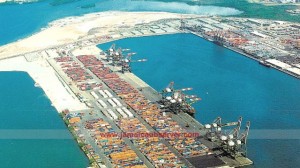 THE Port Authority of Jamaica (PAJ) is facing a number of challenges trying to meet its commitment to have the Port of Kingston ready to share in the massive increase in traffic expected from the reopening of the Panama Canal in 2016.
THE Port Authority of Jamaica (PAJ) is facing a number of challenges trying to meet its commitment to have the Port of Kingston ready to share in the massive increase in traffic expected from the reopening of the Panama Canal in 2016.
One of the biggest setbacks has been a loss of $157 million reported for the first seven months of 2014, due primarily to the devaluation of the Jamaican dollar over the period.
Another major challenge is that there is only one bidder on which a chance of private participation in the project hinges and, according to PAJ Chairman Professor Gordon Shirley, if those negotiations fall through the PAJ will have to take on the task of dredging the port, although the Government has already declared that it will not be providing any more guarantees for such loans, due to its current Extended Fund Facility with the International Monetary Fund (IMF).
An assessment of the PAJ’s financial situation provided by Public Administration and Appropriations Committee (PAAC) technical adviser Earl Bartley showed that, although the PAJ earned revenues of approximately $5.6 billion and reduced operational expense to $3.4 billion in the first seven months of 2014, on which it was reporting to the PAAC and which should have resulted in an operational surplus of some $1.4 billion, ended up with a $157-million loss.
The loss was primarily attributed to what the authority called “unrealised exchange losses”, or simply losses due to the continued devaluation of the Jamaican dollar over the period.
According to the PAJ’s senior vice-president for finance, Elva Williams Richards, the authority would have ended up with a profit of close to $1 billion without the intrusion of devaluation.
“It is heavy and, as you are aware, over many years the strategy that was used by the authorities to develop
the port and related activities is by way of loan
funding, borrowing,” she responded to questions from Government MP Mikael Phillips.
She said that the PAJ was now attempting to change gears by engaging in an attempt at a private partnership to assist in the development of the port, including the dredging that is necessary to accommodate the larger vessels expected to be passing through the areas when the Panama Canal reopens.
Updating the committee, chaired by Opposition MP Edmund Bartlett, Shirley explained that bidding for the private partnership closed at the end of August. But there was only one tender from a global terminal operator, he admitted, in response to Opposition spokesman on finance and planning Audley Shaw.
He said that the bid is currently being evaluated, and although the bidding process has been delayed because of queries from the parties involved and the timetable may be pushed back, he was still hopeful of making the deadline.
“We are again hoping that we will be able to aggressively bring that to a conclusion. The timing of the conclusion is important because we would like the dredging to commence as quickly as possible,”
Shirley said.
“Suffice it to say that the Port Authority would not place all of its eggs in one basket, and we have been pursuing all of the technical analyses which would be necessary. We have been in contact with all of the global dredging firms who have all expressed an interest in this project. And so, even if the tender process should not be completed, we think that we would be in process to begin dredging in 2015,” he explained.
He admitted that the dredging would cost at least $160 million. However, he said that the privatisation is going according to plan, up to this point.
Shirley admitted, too, that the PAJ is already wrestling with a huge loan debt which is mainly in US dollars, but insisted that there was a debt-management plan.
